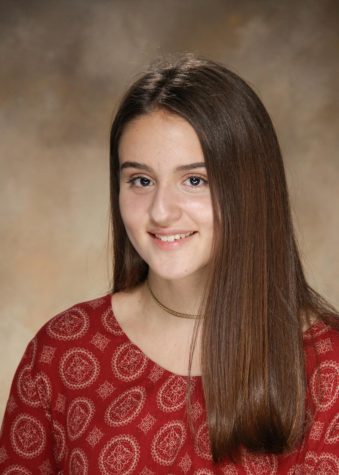Kabbalat Shabbat hand-crafted
Putting together school-wide assemblies that make a statement
Director of Jewish Life Stephanie Hoffman speaks at Kabbalat Shabbat.
June 1, 2016
Every Friday morning, students pour into the gym for Kabbalat Shabbat. What they do not see, however, is the preparation that goes on behind the scenes.
At the very beginning of the year, Director of Jewish Life Stephanie Hoffman, the coordinator of Kabbalat Shabbat, formulated a calendar marked with every Friday of school which included the parsha and any significant event in school that week. This informational calendar influences who speaks and what people talk about or perform. Kabbalat Shabbat begins with a D’var Torah, which is commentary on that week’s parsha, and is followed by a musical performance.
The spots for performing or giving a D’var Torah are usually assigned to students and faculty who approach either Hoffman or Director of Arts Education David Solomon. In some cases, however, Hoffman or Solomon will ask students or faculty members if they would like to give a D’var Torah or perform if there are openings in the schedule.
Once someone agrees to speak or perform at Kabbalat Shabbat, they receive an email from Hoffman with specific guidelines, one of which is the 3 ½ minute time limit for a speech or performance. Additionally, she notifies people giving a D’var Torah to include one Jewish commentary in their speech to help support their argument.
Sophomores Lois Richman and Hannah Wandersman were approached by Hoffman earlier this year to give a D’var Torah on April 8. The parsha of the week, Parshat Tazria, discusses a skin disease that is formed due to gossip, and they used the lessons of the parsha as a lens to bring attention to the ongoing issue of slander.
“Instead of just speaking to your class or your grade, it’s a way that everyone can hear it, everyone is listening,” Richman said. It’s a great way to get your message out.”
As each Kabbalat Shabbat approaches, Hoffman and Solomon have a lot to do. Hoffman reviews each D’var Torah about a week in advance, and works with the speaker to edit and refine their speech while Solomon approves each musical act. Each Friday morning is the final rehearsal for the participants.
Solomon enjoys coordinating the performances at Kabbalat Shabbat because he likes to witness students exhibiting their passions.
“When kids get up and perform for their peers, they are rock stars,” Solomon said. “It’s something that everybody looks forward to and I love that sense of community when it happens.”
Freshman Talia Shemony is an example of a student who shows her love for singing during Kabbalat Shabbat. She has performed at Kabbalat Shabbat three times and made her debut on Dec. 13, 2013 when she dedicated a song she wrote to Gilad Nissim (‘12), a former CESJDS student who died of a brain aneurysm.
“I try to put a lot of emotions into performances, especially when it is for someone who has passed away,” Shemony said.
According to Solomon, performers prepare for their act mainly on their own. Shemony prepared by practicing the music room during lunch and clubs to practice, as well as singing at home.
Not only students, but also teachers, exhibit their talents during Kabbalat Shabbat. Science teacher Rachel Gill has been dancing since middle school, and was approached by Solomon to perform an Irish step dance.
Gill was in an Irish step dance group for 17 years in her hometown of Gettysburg, Pa., and now is currently looking for a new group to join in Maryland. Gill made use of the choreography skills she learned while in her dance group by choreographing her Kabbalat Shabbat performance. Many of her students wanted her to perform and show her skills.
Students have a lot of impact as Kabbalat Shabbat comes together every week. Even though Hoffman is a main part of organizing, she feels that it is essentially guided by students.
“We see our students’ interests come out,” Hoffman said. “It’s not just because we are talking about [students], it’s because they are actually doing it, and there is something really special about that.”








